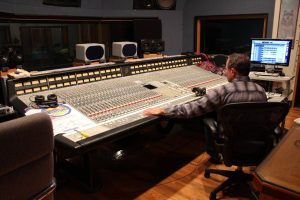Many moons ago back when tape machines were the mainstay in all studios throughout the land, I was a young, ambitious kid in my late teens attending Shoreline Community College’s recording arts program. During this time I was also interning at a local rehearsal studio and live production company where I was thrown into the Seattle area studio scene at company that eventually acquired Triad Studios.
Keeping my ear to the ground and researching local studios and the competition, I remember seeing listings in Mix Magazine for this out of the way studio in Index, Washington. Now Index is not exactly close to Seattle but it’s reachable at about an hour and 15 minute drive from the Eastside with no traffic. (Yes, I actually did this). Nestled up in the Cascade mountains right off US Highway 2, it’s a beautiful, serene setting, ideal for tracking for a film score or album. Quite frankly it would be my first choice if I wanted to be away from the city and metro area hustle and bustle.
Owner Patrick Sample is from Montana, but early on attended the old Recording Workshop in Ohio. He then  proceeded to work with Jim Wolf at the Music Source in downtown Seattle before going out on his own in 1984 starting with a Harrison MR4 console. Then in 1992 he purchased the SSL console from the Metalworks recording studio in Toronto Canada, which was owned by one of the members of Triumph.
proceeded to work with Jim Wolf at the Music Source in downtown Seattle before going out on his own in 1984 starting with a Harrison MR4 console. Then in 1992 he purchased the SSL console from the Metalworks recording studio in Toronto Canada, which was owned by one of the members of Triumph.
Legendary studio acoustics designer Chips Davis had his hands all over this studio when it was built in the early 1990s. And if you add the quality of the construction build out and spaciousness of the control room and main room, you have a really nice atmosphere to create all kinds of music, vocals, and sounds.
Today, 30 some odd years after opening its doors, Paradise is still fully functioning and operating with its Solid State Logic console 4000G series console, ProTools, a fabulous rack of outboard gear, and multi-room setup.
Like so many studios throughout North America, Paradise has had its ups and downs, yet they are still rolling along. Analog machines are no longer in use, but the Otari and Studer decks are still there waiting silently for the day when they can be resurrected to spin reels of 2” and 1/2” tape.
With so few studios of this quality and size left in the Pacific Northwest, it was such a pleasure to spend the morning with Pat, Karen and our tracking pianist Dwayne Parsons. Look for their story in the upcoming Road to Record documentary and book.
 proceeded to work with Jim Wolf at the Music Source in downtown Seattle before going out on his own in 1984 starting with a Harrison MR4 console. Then in 1992 he purchased the SSL console from the Metalworks recording studio in Toronto Canada, which was owned by one of the members of Triumph.
proceeded to work with Jim Wolf at the Music Source in downtown Seattle before going out on his own in 1984 starting with a Harrison MR4 console. Then in 1992 he purchased the SSL console from the Metalworks recording studio in Toronto Canada, which was owned by one of the members of Triumph.
Recent Comments